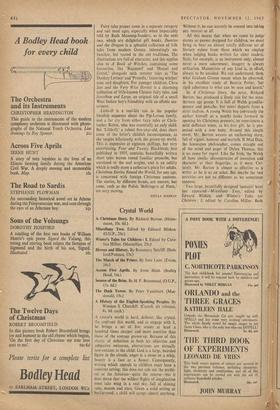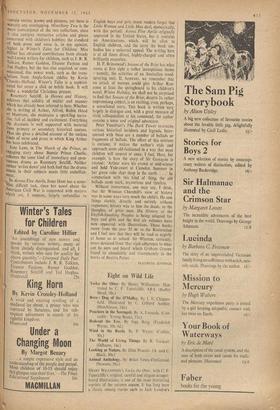Crystal World
Miscellany Two. Edited by Edward Blishen. (O.U.P., 25s.) Across Five Aprils. By Irene Hunt. (Bodley Head, 16s.)
A CHILD'S world is hard, definite, like crystal. To confront this world, and to engage with it, he brings a set of five senses at least a hundred times sharper and more sensitive than those of the average grown-up. Because of this clarity of definition in both his objective and subjective universes, abstractions are virtually non-existent to the child; God is a large, bearded figure in the clouds, anger is a stone or a whip, beauty is a face or a flower. Consequently, writing which appeals to children must have a concrete setting; this does not rule out the mythi- cal or the fabulous—quite the reverse—but it does mean that the wildest flights of imagination must take wing in a real sky, full of shining suns, moons and stars. Given a solid setting or background, a child will accept almost anything.
Without it, he can scarcely be coaxed into taking any interest at all.
All this means that when we come to judge stories or poems designed for children, we must bring to bear an almost totally different set of literary values from those which we employ when judging books written for older readers. Style, for example, is an instrument only, almost never a mere adornment; imagery is always utilitarian. Mannerism of any kind is, in effect, always to be avoided. We can understand, then, what Graham Greene meant when he observed, in his excellent study of Beatrix Potter, .`her rigid adherence to what can be seen and heard.'
In A Christmas Story, the actor, Richard Burton, has produced a lively tale for the nine- thirteen age group. It is full of Welsh grandilo- quence and panache, but never departs from a strict realism. A young Welsh boy (obviously the author himself as a youth) looks forward to opening his Christmas presents; he experiences a mild deflation when, as his first gift, he is pre- sented with a new baby. Around this simple event, Mr. Burton weaves an enchanting story, full of vigour, humour and warmth. If Mad Dan, the homespun philosopher, comes straight out of the mind and pages of Dylan Thomas, this is no cause for regret. Like the Irish, the Welsh all have similar idiosyncrasies of invention and character at their fingertips, as it were. Cer- tainly, Mr. Burton is almost as effective as a writer as he is as an actor. But maybe the two activities are not so different as we sometimes suppose.
Two large, beautifully designed 'annuals' have just appeared--MiAcellany Two, edited by Edward Blishen, and Winter's Tales for Children : 1, edited by Caroline Hillier. Both contain stories, poems and pictures, yet there is scarcely any overlapping. Miscellany Two is the more conventional of the two collections, since it also contains instructive articles and pieces concerned with children's hobbies; the standard of both prose and verse is, in my. opinion, higher in Winter's Tales for Children. Miss Hillier has obtained contributions from already well-known writers for• children, such as J. R. R. rolkien, Rumer Godden, Eleanor Farjeon and red Hughes, but she has also acquired, or com- missioned, fine newer work, such as the trans- lations from Anglo-Saxon riddles by Kevin Crossley-Holland. Winter's Tales is a sophisti- cated but never a slick or brittle book. It will make a wonderful Christmas present.
Rosemary Sutcliff, in Heroes and History, achieves that solidity of matter and manner Which has already been referred to here. Whether she is writing of Arthur, Alfred, Robin Hood or Montrose, she maintains a sparkling narra- tive, full of incident and excitement. Everything she discusses is well supported with material from primary or secondary historical sources. Thus she gives a detailed account of the various IQ kinds of verse and prose in which King Arthur has been celebrated.
Jane Lane, in The March of the Prince, an engaging story about Bonnie Prince Charlie, achieves the same kind of immediacy and spon- taneous drama as Rosemary Sutcliff. Neither author 'writes down' and both find that the drama 'Mate in their subjects needs little embellish- ment.
In Across Five Aprils, Irene Hunt has a some- ) *hat difficult task, since her novel about the American Civil War is concerned with matters Which are, 1 suppose, largely unfamiliar to English boys and girls (most readers forget that Little Women and Little Men deal, domestically, with this period). Across Five Aprils originally appeared in the United States, but it contains no Americanisnis which will be alien to English children, and the story the book em- bodies has a universal appeal. The writing here is at all times direct, highly-charged and often brilliantly evocative.
H. F. Brinsmead's Season of the Briar has what seems at first sight a rather inauspicious theme —namely, the activities of an Australian weed- spraying unit. If, however, we remember that an attack of mumps could give Arthur Ran- some at least the springboard to his children's novel, Winter Holiday, we shall not be surprised to find that Season of the Briar, despite its rather unpromising subject, is an exciting, even, perhaps, a sensational story. This book is written very largely in dialogue and, with a great measure of vivid colloquialism at his command, the author sustains a tense and original adventure.
Peter Vansittart's The Dark Tower re-creates various historical incidents and legends. Inter- spersed with these are a number of ballads or fragments of ballads. The effect of this mixture is curious; it makes the author's style and approach seem old-fashioned in a way that most children will suspect at once, I feel. Here, for example, is how the story of Sir GaWayne is treated: 'Arthur wore his crown at mid-winter and held Yule-court at Camelot. Summer in
her green robe slept deep in the earth. . . In comparison with this kind of thing, the old ballads seem stark, mysterious and timeless.
Without irreverence, one may say, I think, that Sir Winston Churchill's view of history was in some ways very much the child's. He saw things starkly, directly and entirely without vagueness; history was to him the deeds, or the thoughts, of great men. His History of the English-Speaking Peoples is being adapted for boys and girls and the first six volumes have now appeared, with illustrations. These books move from the year 55 BC to the Restoration and I feel sure that they will be read as eagerly at home as at school. Sir Winston, certainly, never deviated from 'that rigid adherence to what can be seen and heard' which Graham Greene found so abundantly and triumphantly in the works of Beatrix Potter.
ELIZABETH II JENNINGS















































 Previous page
Previous page